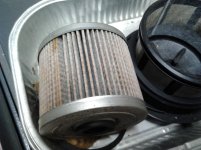Here is a press release from the Pentagon regarding their multi billion dollar program to increase energy efficiency in all areas. Ya think they would have a few bucks to test out fuel additives. I do recognize that the military can specify exactly how they want their fuel formulated but the notion that their current standards to not mention cetane or lubricity, two areas that additives focus on, might tell us that they haven't found naturally occurring levels in big oil fuel products to be lacking.
IMMEDIATE RELEASE
Release No: 678-12
August 15, 2012
Department of Defense Certifies Key Energy Investments Support Increased Combat Capability
The Department of Defense’s proposed budget supports the military’s operational energy goals according to a report released today titled “Energy Investments for Military Operations: for Fiscal Year 2013.”
The report certifies that the Defense Department’s proposed 2013 budget adequately funds the operational energy strategy, highlighting $9 billion in planned investments to improve energy use in military operations between fiscal years 2013-2017. This includes $1.6 billion in fiscal 2013.
“The innovative approach the Defense Department is taking to achieving greater operational efficiency and boosting combat effectiveness is exactly in line with our new defense strategy,” Secretary Leon E. Panetta said. “These investments in new energy technologies, more than 90 percent of which are for energy efficiency or energy performance upgrades, will enable our forces to operate longer and at greater distance while enhancing our energy security at home and, in many cases, reducing costs.”
The Operational Energy Strategy, released in June 2011, stated three ways DoD will increase energy security in military operations -- by reducing the demand for fuel, diversifying energy supplies and incorporating these considerations into building the future force.
For the report, Sharon E. Burke, assistant secretary of defense for operational energy plans and programs and her team examined the Defense Department budget to see how well energy investment matched these three elements.
“Our first priority with these investments is to improve combat capabilities for our warfighters,” said Burke. “From tactical solar technologies to reduce the need to transport and protect fuel in combat to more efficient aircraft, ship, and combat vehicle engines that let our forces fly, sail, and drive further, the Defense Department is tackling energy use to improve military capability.”
The report is online at:
404 - File or directory not found. .

